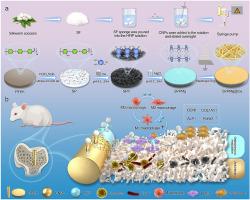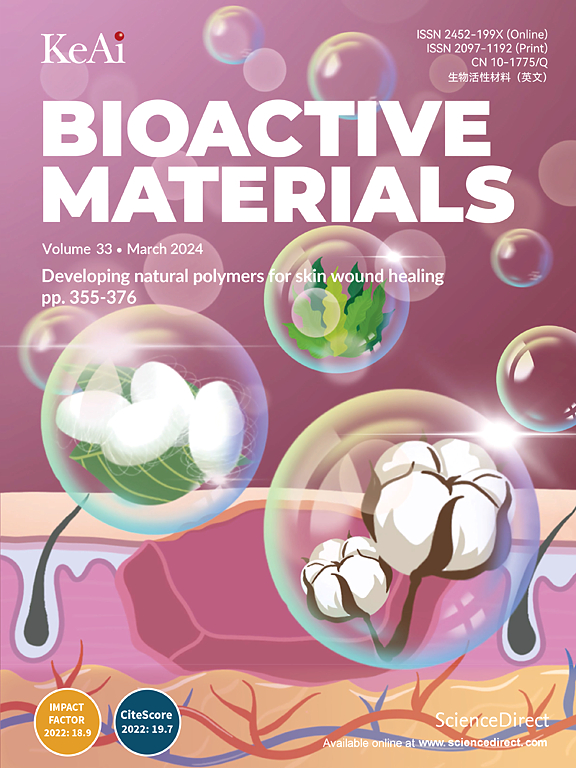具有抗菌和骨免疫调节特性的微环境响应型聚醚醚酮植入物可促进骨结合
IF 18
1区 医学
Q1 ENGINEERING, BIOMEDICAL
引用次数: 0
摘要
骨内修复失败的主要原因是种植体松动和感染。目前的主要治疗方法,如抗生素和局部清创,不仅在彻底清除顽固的附着细菌方面面临挑战,而且在改善不当的炎症反应和再生受损的种植体周围骨组织方面也遇到困难。聚醚醚酮(PEEK)具有优良的机械和物理化学特性,已被广泛用作医用生物材料。然而,生物惰性 PEEK 的杀菌和骨结合活性有限,限制了其临床应用。在此,通过聚多巴胺(PDA)介导的离子配位和基于胶原结构-仿生蚕丝纤维蛋白(SF)的电纺丝,设计了一种具有固定免疫调节镁离子(Mg2+)和消毒剂氧化铈纳米颗粒(CNPs)的微环境响应涂层。通过利用 SF 的 pH 响应性,CNPs 在局部细菌感染引起的酸性环境(pH 值为 5.0)中表现出强大的抗菌效果。由于与 PDA 的螯合作用和 SF 的约束,Mg2+ 被缓慢释放,从而改善了局部免疫微环境,并通过上调 M2 表型巨噬细胞促进成骨。生物信息学分析表明,炎症是通过 NF-κB 信号通路被抑制的。总之,这种基于 SF 的涂层最大限度地发挥了 CNPs 和 Mg2+ 的协同作用,增强了抗菌和骨免疫调节生物活性,有助于成功植入。本文章由计算机程序翻译,如有差异,请以英文原文为准。

A microenvironment responsive polyetheretherketone implant with antibacterial and osteoimmunomodulatory properties facilitates osseointegration
Failure of intraosseous prostheses is primarily attributed to implant loosening and infections. Current primary therapeutic modalities, such as antibiotics and local debridement, not only face challenges in thoroughly eliminating obstinate adhered bacteria but also encounter difficulties in ameliorating undue inflammatory reactions and regenerating impaired peri-implant bone tissues. Polyetheretherketone (PEEK) has excellent mechanical and physicochemical characteristics and has been used extensively as a medical biomaterial. However, the limited bactericidal and osseointegrative activities of bioinert PEEK restrict its clinical application. Herein, a microenvironment responsive coating with immobilised immunomodulatory magnesium ions (Mg2+) and disinfectant cerium oxide nanoparticles (CNPs) is designed via ion coordination mediated by polydopamine (PDA) and electrospinning based on collagen structure-bionic silk fibroin (SF). By utilising the pH responsiveness of SF, CNPs exhibit potent antibacterial effects in an acidic environment (pH 5.0) caused by local bacterial infection. Due to the chelation interaction with PDA and the constraint of SF, Mg2+ is slowly released, ameliorating the local immune microenvironment and boosting osteogenesis by upregulating M2 phenotype macrophages. Bioinformatics analysis indicates that the inflammation is suppressed via the NF-κB signaling pathway. Overall, this SF-based coating maximizes the synergistic effect of CNPs and Mg2+, offering enhanced antibacterial and osteoimmunomodulatory bioactivity for successful implantation.
求助全文
通过发布文献求助,成功后即可免费获取论文全文。
去求助
来源期刊

Bioactive Materials
Biochemistry, Genetics and Molecular Biology-Biotechnology
CiteScore
28.00
自引率
6.30%
发文量
436
审稿时长
20 days
期刊介绍:
Bioactive Materials is a peer-reviewed research publication that focuses on advancements in bioactive materials. The journal accepts research papers, reviews, and rapid communications in the field of next-generation biomaterials that interact with cells, tissues, and organs in various living organisms.
The primary goal of Bioactive Materials is to promote the science and engineering of biomaterials that exhibit adaptiveness to the biological environment. These materials are specifically designed to stimulate or direct appropriate cell and tissue responses or regulate interactions with microorganisms.
The journal covers a wide range of bioactive materials, including those that are engineered or designed in terms of their physical form (e.g. particulate, fiber), topology (e.g. porosity, surface roughness), or dimensions (ranging from macro to nano-scales). Contributions are sought from the following categories of bioactive materials:
Bioactive metals and alloys
Bioactive inorganics: ceramics, glasses, and carbon-based materials
Bioactive polymers and gels
Bioactive materials derived from natural sources
Bioactive composites
These materials find applications in human and veterinary medicine, such as implants, tissue engineering scaffolds, cell/drug/gene carriers, as well as imaging and sensing devices.
 求助内容:
求助内容: 应助结果提醒方式:
应助结果提醒方式:


